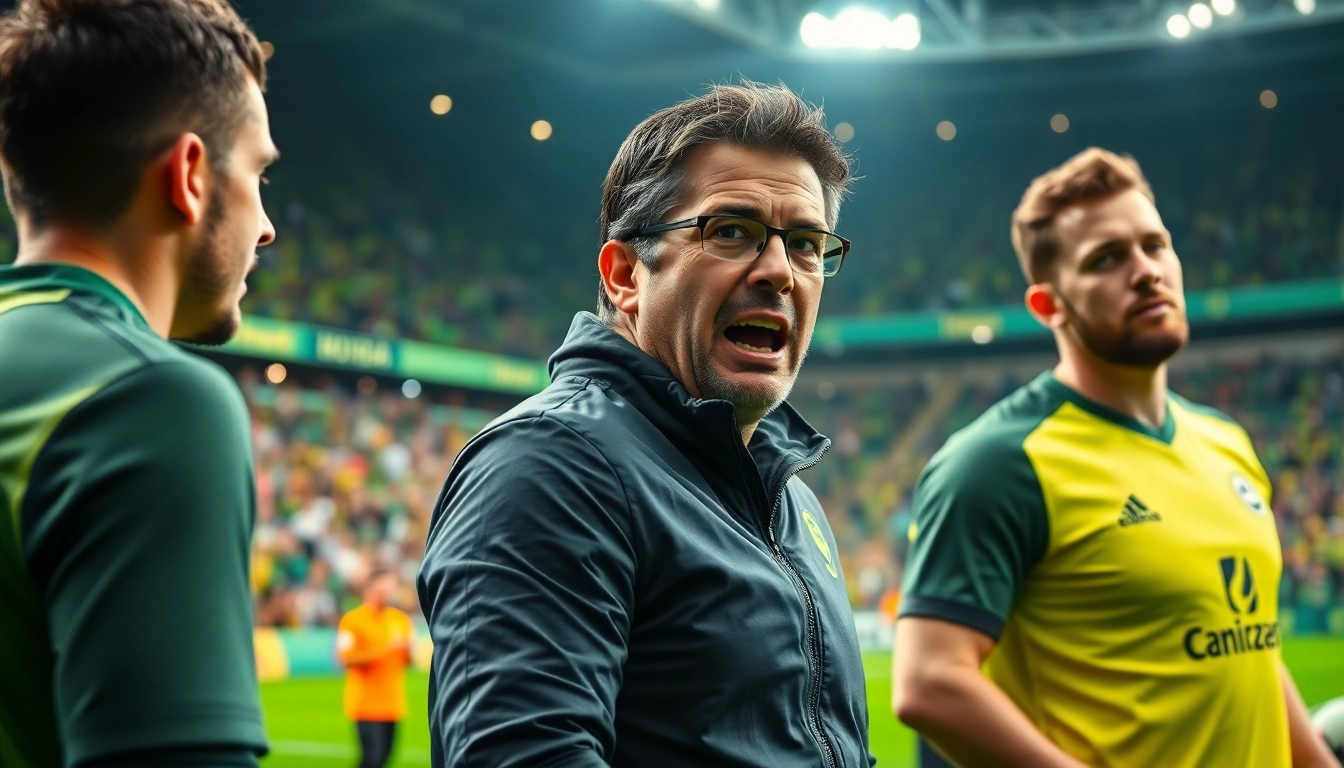Understanding the Silva Coach Philosophy
Key Principles of Coaching Success
The philosophy of a silva coach revolves around a foundational set of principles that define successful coaching in modern football. These principles are built on the notion that coaching is not just about managing a team to win games, but also about fostering an environment where players can grow both individually and collectively. The key tenets of this philosophy include adaptability, resilience, and a strong focus on player development.
One of the central ideas in the Silva Coach philosophy is the importance of adaptability. Coaches must be prepared to adjust their strategies based on the strengths and weaknesses of their teams, as well as the characteristics of their opponents. This flexibility not only allows for game-by-game adjustment but also emphasizes the need for coaches to continuously evolve their tactical approaches.
Additionally, resilience plays a crucial role. The ability to bounce back from setbacks and learn from defeats strengthens a team’s mentality. Silva coaches instill this mindset in players, encouraging them to view challenges as opportunities for growth rather than as obstacles.
Finally, a dedicated focus on player development is a hallmark of successful coaching. This involves not only enhancing technical skills and tactical understanding but also supporting players’ mental health and confidence, which are paramount for peak performance on the pitch.
How Silva Coach Cultivates Team Cohesion
Team cohesion is vital for achieving consistent results in football, and the Silva coach excels at fostering a unified environment. The approach includes open communication, regular team-building activities, and creating a culture of trust within the squad.
Open communication allows players to express their thoughts, concerns, and ideas freely. Silva coaches actively encourage dialogue, ensuring that players feel heard and supported. This inclusive environment can significantly improve morale and encourage collaboration on the pitch.
Regular team-building activities are also pivotal. These can range from friendly matches to off-field bonding experiences. Such activities promote camaraderie, help to break down barriers, and build lasting relationships among squad members.
Creating a strong culture of trust is essential; players must believe in their coach’s vision and each other’s abilities. Silva coaches prioritize transparency, establishing a clear framework of expectations and accountability. This trust directly translates into better performance and teamwork during matches.
Strategic Game Management Insights
Another hallmark of a successful silver coach lies in their strategic game management abilities. This encompasses not only tactical foresight but also the ability to make key decisions during a match. Silva coaches analyze their opponent’s play style, formation, and key players to devise a tailored game plan.
Adjusting tactics on the fly is essential; for example, if an opponent is exploiting a certain weakness, the silva coach must be prepared to shift formations or tactics sooner rather than later. Additionally, this involves making timely substitutions to invigorate the squad with fresh energy or skill sets that can effectively counteract the opponent’s strategy.
Moreover, understanding game dynamics is crucial. Silva coaches pay close attention to momentum shifts, recognizing the psychological aspects of a match and using strategic pauses, timeouts, and side-line coaching to recalibrate the team’s focus and energy levels.
Critical Skills of a Silva Coach
Communication Techniques for Maximum Engagement
Effective communication is foundational for a Silva coach. It empowers players and fosters a culture of openness, enabling coaches to relay their vision while also ensuring that feedback flows both ways. Silva coaches employ various communication techniques to engage their players, including verbal and non-verbal cues, active listening, and personalized feedback.
Verbal communication should be clear and concise, focusing on the key messages that can be easily understood. Silva coaches tailor their communication to the individual needs of each player, recognizing that different players may respond to different messages. Active listening is equally important, as it builds respect and understanding. Coaches who genuinely take the time to listen to their players’ concerns and insights can adjust their coaching methods accordingly.
Moreover, non-verbal communication—such as body language, eye contact, and gestures—can significantly enhance messaging. A well-timed pat on the back or a reassuring nod during critical moments can motivate a player far beyond mere words.
Adapting Tactics to Opponents
In today’s competitive football landscape, adaptability is a vital skill for Silva coaches. This means conducting thorough analyses of opponents to predict their strategies and behavior on the field. Silva coaches utilize data analytics, video analysis, and scouting reports to gain insights into the strengths and weaknesses of each opponent.
Upon gathering this information, Silva coaches create specific tactical plans. For example, if an opponent relies heavily on wing play, a silva coach may opt for a formation that fortifies the defensive flanks while also enabling quick counter-attacks down the center.
In-game adaptability is equally crucial. Coaches must be prepared to alter their tactics in real time when situations change mid-match. This could involve switching formations, adjusting player roles, or utilizing different set pieces. The ability to read the game and instinctively make adjustments on the pitch is a distinct skill of a Silva coach.
Building Player Relationships for Success
A key aspect of Silva’s coaching approach is the emphasis on building strong relationships with players. This goes beyond mere interaction; it involves understanding each player’s individual motivations, personal circumstances, and career aspirations. Silva coaches recognize that satisfied and valued players are more likely to perform at their best.
To build these relationships, Silva coaches often engage in one-on-one conversations with players, offering personalized guidance and mentoring. This individualized attention makes players feel valued and respected, fostering loyalty and commitment to the team’s goals.
Furthermore, Silva coaches actively promote a family-like environment within the squad. This nurturing atmosphere encourages players to support one another, creating a sense of belonging and shared purpose, which ultimately translates into better team dynamics and performance.
Real-world Examples of Silva Coach Impact
Case Studies of Teams Transformed Under Silva’s Leadership
Examining case studies of teams coached by Silva reveals the profound impact of his coaching philosophy. For instance, Silva’s tenure at clubs like Watford and Hull City showcases his ability to revitalize squads that were struggling. At Watford, he turned the team around by instilling discipline and a tactical approach that temporated with the players’ strengths.
Under Silva, Watford saw a marked increase in both their attacking prowess and defensive organization, helping them finish in a comfortable mid-table position. Similar transformations can be observed at Hull City, where Silva guided the team to significant victories against higher-ranked opponents, showcasing remarkable tactical depth and strategic flexibility.
The examples underscore how a Silva coach can not only achieve immediate success but also set the foundation for long-term growth and stability within a club.
Analyzing Match Success Rates
Success rates are critical metrics in football that highlight a coach’s effectiveness. Silva coaches consistently showcase impressive win ratios over their managerial careers. By analyzing match outcomes before and after Silva’s arrival at various teams, one can quantify the tangible impact of his coaching.
On average, teams under Silva’s management record an increase in their success rates by a significant margin. For instance, data from his tenure at Everton shows a marked improvement in the club’s win rate and points per game compared to previous seasons. These statistics reflect not just the immediate impact of a silva coach but also their capacity for sustained results over longer periods.
Comparative Analysis with Other Coaching Styles
When comparing the Silva coaching style to other strategies, notable differences emerge. Coaches who focus heavily on tactical rigidity often fall short in dynamic environments that require adaptability. In contrast, Silva’s coaching philosophy emphasizes flexibility, allowing him to pivot strategies based on the current game scenario.
Moreover, unlike coaching styles that prioritize results over player well-being, Silva’s approach seeks to nurture players holistically. This results in not only better team chemistry but also improved individual performances, as players feel empowered and valued within the system.
Challenges Faced by a Silva Coach
Handling Pressure and Expectations
Coaching at higher levels inevitably comes with intense pressure and high expectations. Silva coaches are often tasked with delivering results quickly—often with minimal time for development. Managing this pressure requires mental toughness, strategic prioritization, and effective stress management techniques.
Coaches must be adept at compartmentalizing external expectations while focusing on their team’s development and performance goals. By maintaining a clear vision and strategic plan, Silva coaches can keep goals manageable and realistic, reducing the potential for burnout among players and themselves.
Dealing with Player Conflicts
Conflicts among players can arise due to differences in personality, competition for positions, or external pressures. Silva coaches must be equipped with conflict resolution skills to address these disputes delicately. Effective communication, empathy, and a willingness to listen are fundamental within their approach to managing conflicts.
Utilizing mediation techniques, Silva coaches prioritize resolving issues before they escalate, maintaining team harmony and focus. By promoting an open dialogue and a culture akin to family, players are more likely to express concerns directly rather than letting them fester.
Adapting to Evolving Game Trends
The game of football is ever-evolving; thus, Silva coaches need to stay ahead of the curve by embracing new tactics and trends. This requires continuous education, whether through watching matches, analyzing evolving strategies, or networking with other coaches and professionals in the sport.
Moreover, a willingness to experiment and implement innovative approaches is vital for a Silva coach’s success. This might involve introducing advanced analytics into training, utilizing technology to monitor player fitness, or adapting training methodologies to align with contemporary playing styles.
The Future of Coaching: Insights from a Silva Coach
Emerging Trends in Football Management
The landscape of football management is shifting, with emerging trends shaping the future of coaching. One significant trend is the growing emphasis on mental health and well-being in the game. Silva coaches are ahead of the curve in recognizing that a player’s mental state is critical for peak performance and prioritizing psychological support alongside physical training.
Additionally, there is an increasing reliance on data analytics to inform coaching decisions. Silva coaches embrace technology to improve match preparation and in-game strategies, allowing for more informed decisions based on real-time data.
Technological Integration in Coaching Practices
As technology continues to advance, silva coaches are incorporating various tools into their coaching practices. Video analysis, for instance, helps in dissecting match performances and preparing for future games. This foresight enables coaches and players to rectify errors and capitalize on strengths.
Wearable technology like GPS trackers and fitness monitors allows coaches to analyze player performance metrics—monitoring everything from distance covered to heart rates during matches. Silva coaches utilize this data to tailor training regimes that optimize performance while minimizing injury risks.
Strategic Predictions for Future Success
Looking ahead, the future of coaching under the Silva philosophy appears promising. Focused on adaptability, player relationships, and technological integration, the Silva coaching style aligns perfectly with the trends shaping future football. Coaches who can implement these ideas effectively will likely see sustained success in modern football management.
Ultimately, the core of the Silva coach philosophy is about building robust teams that thrive in pressure situations while maintaining integrity, transparency, and a shared vision for success. As these trends continue to evolve, Silva coaches will undoubtedly remain at the forefront of innovation in football management.



